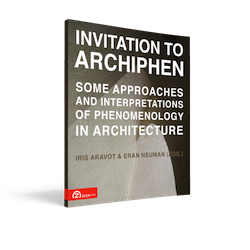Invitation to ArchiPhen
Epuizat din stoc
SKU
C163642
81.73 LEI
Pe scurt
ArchiPhen is simultaneously architecture and phenomenology, architecture's phenomenology, phenomenology in architecture.
The name was coined in a moment of conviction that an invitation to ArchiPhen is timely for practitioners, scholars and students unaware of the importance of phenomenology for architectural discourse and making within a contemporary context. Phenomenology is rooted in the first person perspective and seeks inter-subjectivity, the shared cognition that shapes our ideas and relationships with the world surrounding us. With reference to architecture, the study of phenomenology may inform architectural discourse by borrowing from phenomenologists-philosophers, by implementing phenomenological thought in architectural making, analysis and interpretation, and by applying phenomenology, as radical empiricism, to the realm of architecture. Although phenomenology has been practiced in various guises for centuries, it came into its own in the early 20th century, and was explicitly related to architecture for the first time in the 1950's. Many scholars have since contributed, to the discussion of architecture-phenomenology, themes for consideration that have evolved with the metamorphosis of architectural history and its context. Shedding light on the most profound concerns of architecture, the field is attracting new generations of scholars in a variety of events, among them participants in the Architecture and Phenomenology Conference, held at the Technion, Israel Institute of Technology in May 2007. Based on a selection of conference presentations, this publication of short, illustrated essays intends to provide an accessible entrance into the field of architecture and phenomenology. Authors were requested to briefly address existing or planned buildings, as examples of the relevance of phenomenology to architecture. (Iris Aravot)
TABLE OF CONTENTS
Iris Aravot: Preface
Iris Aravot: Phenomenology as Architectural Method
Eran Neuman: The Present State of Phenomenology in Architecture
Danit Baruch: Bangkok (or a Tel-Aviv love song)
Michael Asgaard Andersen: Utzon’s Bayview House
Ana Paula Baltazar dos Santos: Trans_Ports 2001: A Virtual Phenomenon
Aviv Livnat: Space that Sees: James Turrell (1992)
Derya Yorgancioglu: Steven Holl: A Translation of Phenomenological Philosophy into the Realm of Architecture
Gianluca Fedi: Church of Saint John Baptist in Florence
Benoit Jacquet: A place of Immanence: Hiroshima’s Ground Zero
Jin Baek: Empty Cross and Shintai: Tadao Ando’s Church of the Light
Leslie Kavanaugh: Koen van Velsen’s Folded Cinema:A Plea for Le Pli
Nili Portugali: Taken on the Site Itself - A transformational Planning Process
Kasper Lægring Nielsen: The Phenomenology of Daniel Libeskind's Jewish Museum Berlin
Alexander (Sasha) Ortenberg: Of Diamonds and Dust
Ulrike Passe: House Marxen, Germany, 2001
Stephanie Brandt: The Art of Memory Peter Zumthor’s Therme Vals
Uri Jacob Matatyaou: Memorial Architecture as Storyteller
TABLE OF CONTENTS
Iris Aravot: Preface
Iris Aravot: Phenomenology as Architectural Method
Eran Neuman: The Present State of Phenomenology in Architecture
Danit Baruch: Bangkok (or a Tel-Aviv love song)
Michael Asgaard Andersen: Utzon’s Bayview House
Ana Paula Baltazar dos Santos: Trans_Ports 2001: A Virtual Phenomenon
Aviv Livnat: Space that Sees: James Turrell (1992)
Derya Yorgancioglu: Steven Holl: A Translation of Phenomenological Philosophy into the Realm of Architecture
Gianluca Fedi: Church of Saint John Baptist in Florence
Benoit Jacquet: A place of Immanence: Hiroshima’s Ground Zero
Jin Baek: Empty Cross and Shintai: Tadao Ando’s Church of the Light
Leslie Kavanaugh: Koen van Velsen’s Folded Cinema:A Plea for Le Pli
Nili Portugali: Taken on the Site Itself - A transformational Planning Process
Kasper Lægring Nielsen: The Phenomenology of Daniel Libeskind's Jewish Museum Berlin
Alexander (Sasha) Ortenberg: Of Diamonds and Dust
Ulrike Passe: House Marxen, Germany, 2001
Stephanie Brandt: The Art of Memory Peter Zumthor’s Therme Vals
Uri Jacob Matatyaou: Memorial Architecture as Storyteller
| Editura | Zeta Books |
|---|---|
| ISBN | 978-973-1997-36-0 |
| Număr de pagini | 60 |
| Formatul cărţii | 21 x 25 cm |
| Data apariției | 2010 |
| Disponibilitate la furnizor | 2 zile |
Scrie o recenzie


Validate your login